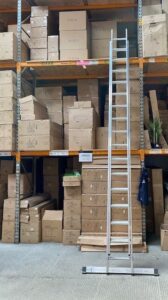Plant hire company in court over work at height and welfare issues
A plant hire company has been fined for leaving workers at risk of a fall from height and failing to provide minimum welfare facilities.
Blackpool Magistrates’ Court heard how, on 17 November 2020, Ruttle Plant (Birmingham) Ltd was in the process of building a new aggregate recycling facility at their site at Common Bank Lane, Chorley. Part of the work included the provision of cladding to the roof, which was carried out using a cherry picker. However, as some areas of the roof were difficult to reach, employees had to step onto the roof where no edge protection had been provided, putting them at risk of a 30ft fall. In addition, workers had been on site for some considerable time without the minimum required welfare facilities being available. This included facilities for hand washing during the height of the Covid pandemic.
An investigation by the Health and Safety Executive (HSE) found that the workers had been left unsupervised by site management, there had been no method statement to follow when they climbed onto the roof and there were no preventative measures in place to prevent the risk of a fall from height. Workers were also expected to drive to the company’s head office along an unadopted roadway more than five minutes’ drive away to use the toilet, despite there being ample room on the site for facilities.
Ruttle Plant Hire (Birmingham) Ltd of Lancaster House, Ackhurst Road, Chorley, Lancashire pleaded guilty to breaches of Regulation 13(4)(c) of the Construction (Design and Management) Regulations 2015, and Regulation 4(1) of The Work at Height Regulations 2005. The company was fined £66,667 and ordered to pay costs of £1,847.
Speaking after the hearing, HSE inspector Christine McGlynn said: “Had a worker fallen off the roof edge, it could have been fatal. Employers should ensure that workers are not left to carry out high risk roof work without supervision.
“Work at height and roof work should only be carried out by trained workers, who are being robustly monitored, following proper planning, risk assessment and using suitable equipment. The minimum standards for welfare must also be met.”
